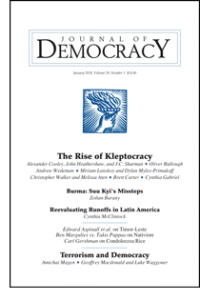 While concerns about illiberalism, populism, and majoritarianism are certainly well-founded, blaming such phenomena on an “excess” of democracy is not, notes Barnard College professor Sheri Berman, a contributor to the National Endowment for Democracy’s Journal of Democracy. Such arguments rest on a fundamental misunderstanding of how liberal democracy has historically developed and how liberalism and democracy actually interact, she writes for Dissent:
While concerns about illiberalism, populism, and majoritarianism are certainly well-founded, blaming such phenomena on an “excess” of democracy is not, notes Barnard College professor Sheri Berman, a contributor to the National Endowment for Democracy’s Journal of Democracy. Such arguments rest on a fundamental misunderstanding of how liberal democracy has historically developed and how liberalism and democracy actually interact, she writes for Dissent:
Historically illiberal democracy has been a stage on the route to liberal democracy rather than the end point of a country’s political trajectory. Indeed, in the past, the experience of, or lessons learned from, flawed and even failed democratic experiments have played a crucial role in helping societies appreciate liberal values and institutions. And many of the problems that have emerged in Western democracies today are not the result of “hyperdemocratization”—but the exact opposite. Over the past decades, democratic institutions and elites have become increasingly out of touch with and insulated from the people, contributing greatly to the anger, frustration, and resentment that is eating away at liberal democracy today.
And as for promoting democracy……
The line of thinking behind the claim that U.S. foreign policy began to go wrong “with the dangerous idea that we could make Western democracies out of countries that had no experience or interest in becoming a Western democracy” is solidly in the tradition of thinkers like Edmund Burke, Alexis de Tocqueville, and even Hegel, insofar as they stressed the cultural and especially religious underpinnings of a regime’s characteristics, argues Paul D. Miller, associate director of the Clements Center for National Security at The University of Texas at Austin. Liberalism is considered the tribal habit of western peoples, the received practice of Western history, he writes for War On the Rocks.







